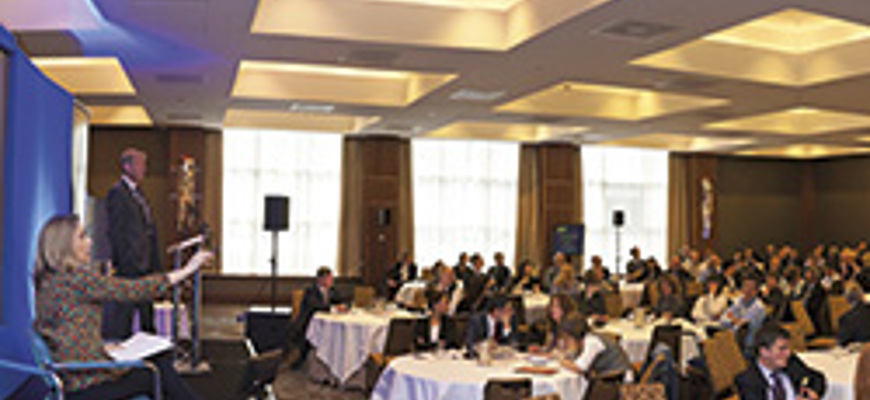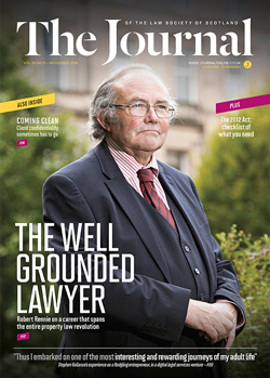Streams of thought

This year the ILG committee joined with the Law Society of Scotland in the production of the Law in Scotland conference “The people’s verdict, so what now?” The ILG decided to try it out this year, because of the great interest in the outcome of Scotland’s independence referendum, which would encourage in-house members to attend and learn from all the delegates. The general conference proceedings are reported at Journal, October 2014, 18.
Opening the conference, Alistair Morris, the Law Society of Scotland President, highlighted the contributions of solicitors to the independence referendum debate, whether as leading politicians or based in the profession. However, the day job carried on, and this was the theme of the conference. He also paid tribute to the work of the ILG and looked forward to working with the ILG going forward.
Global connections
The first ILG streamed session, “Global General Counsel Insights: Navigating the global legal landscape”, was provided by our sponsor firm DLA Piper, and chaired by Callum Sinclair from the firm, with ILG committee chair Lynda Towers. A panel comprising Kenny Robertson, head of services at RBS Legal; Carolyn Jameson, director and general counsel at Skyscanner; Neil MacLennan, group general counsel and company secretary of Exova; and Alistair Drummond, partner at DLA Piper, discussed their experiences of engaging lawyers overseas.
These varied greatly from country to country. Robertson referred to difficulties in trying to get US lawyers to sign up to a local company agreement. He found that it worked best to have a firm such as DLA Piper acting as a local gatekeeper for other firms instructed. Similarly, Jameson’s experience was “very mixed and very challenging”, and often came down to the relationships she was able to build up with local agents. This was easier face to face than by email or phone. Cultural issues could be challenging. MacLennan, whose business comprises a lot of small firms in different countries, observed that it could be especially challenging if a business had little buying power.
Asked for their three top challenges for in-house counsel, each pointed to keeping up with regulation and ethics across the global areas they had business in. MacLennan gave the example of the new economic sanctions against Russia, which had taken up a lot of his time. They also highlighted the challenge of keeping outside legal costs as low as possible. It seemed that everyone in an organisation needed them, and managing expectations of their internal clients was a difficult balancing act.
Asked for their advice to in-house colleagues, the value of in-house internal relationships was flagged, as was being organised and staying on top of the job. “Try and focus on that you are lucky to have an interesting job”, Jameson added.
The panel were also asked for their views on whether there requires to be more regulation or guidance for in-house ethics. None of the panel felt that anything additional was required, and in fact saw ethics for in-house as a positive for their businesses. Making it clear you are there to protect the business, rather than to be an enforcer, is helpful for in-house relationships. Jameson in particular recommended having the “difficult conversation” with the client department to ensure that they are all on board and protected.
Most of the panel had board access, and thought that the UK was moving to a more US-type model where in-house counsel sat at a strategic level and had an input into strategy. Were they contributing to creation of wealth for their business? Even if not directly, examples were given of keeping the company in line with changing laws, avoiding the huge fines that might follow from lack of policies or training, and bringing successful judicial review proceedings, as well as being front and centre when there is a crisis. “We are not a profit centre but we are trying to get people to understand what they bring to the party”, Robertson observed.
Mediation: the in-house alternative
“The Role of In-house Lawyers in Reducing and Managing Disputes: More bangs for less bucks” was presented by John Sturrock QC, chief executive of Core Solutions. Championing the benefits of mediation, he pointed out that in any dispute or debate it is possible for both sides to be right and wrong at the same time – referring to the independence referendum debate, both sides had validity depending on your perspective. Sturrock pointed out that in legal disputes, court resolution is binary – the yes/no answer – but real life is more complex. Mediation can be more cost effective than going to court, and the agreement reached at the end of a mediation is less likely to be defaulted on. He suggested that in-house lawyers have good reason to select mediation, as their goal is to resolve disputes in the most cost effective way.
Sturrock understood that some people would see going to court as being the strong option, but argued that mediation is the stronger one. It is always necessary to challenge assumptions as to what you perceive to be the balance of power between the parties, for example a consumer against a large organisation: the large organisation’s case may be weak, or it may fear publicity and reputational damage. While for many lawyers, the court process is the familiar one and the one they are more comfortable with, a change of habit and culture might be required. He further suggested that there are benefits in using mediation internally, and at an early stage, even when entering into a contract. Helping your organisations to nip problems in the bud before they become costly is always a benefit to employers. Sturrock prescribed building a collaborative culture, designing systems to encourage early problem solving in-house, stepped approaches to conflict management, enhancing competency of your staff and their confidence, improving and embedding skills, and making sure that this is cascaded outwards. He agreed that in any organisation, buy-in from the management or the staff representatives/union will always be of assistance. He finished by advising that the process is the key, and understanding of that process is important.
Riding the digital wave
“Giving Scotland the Digital Edge: Opportunities and the challenges of the digital and connectivity revolution” was provided by Pinsent Masons, with speakers Chris Martin and Matthew Godfrey-Faussett. Both highlighted how use of digital technology has changed substantially in the last 10 years. There is now much more use of smartphones and other devices, but there are still a substantial number of people who are not engaged with these. This gives challenges, but also presents opportunities including cost savings for businesses that can provide and manage services remotely. It matters in Scotland because the Scottish Government is engaging with this industry, one development being “Smart Energy and Smart Cities” – also a big issue in the United States at the moment. Glasgow now has funding to develop itself as a Smart City. The aim is to provide better cities and better places for people to live.
Other areas in which the digital revolution is given opportunities are in relation to life sciences and medical research, a big industry for Scotland, and services provided around a digital platform such as Skyscanner. Energy, both renewables and oil and gas, is a further one. In relation to renewables, a smart grid could replace the current grid, balancing demand and supply more efficiently. For oil and gas, the concern is that there are dwindling supplies which are much more difficult to find. Using automated services on rigs can allow exploration in less accessible areas, but at the same time save costs.
The Scottish Government has developed a digital strategy which is at the heart of the Government, and there is funding available. The panel considered that what is required are good communication pathways, good internet speeds, and storage facilities. The Government is also engaged specifically on the Scotland Wide Area Network (SWAN). The aim is to deliver a single secure public services communications network available for the use of any, and potentially all, public service organisations within Scotland. Both speakers saw Scotland receiving additional devolved powers as an opportunity: it is possible to use these as policy levers to meet the digital needs of businesses. However, they did identify that there is a skills shortage in Scotland at the moment, and this will be a real area of challenge. Another will be in relation to cloud services, particularly regarding data protection.
One recommendation that they had was that Scotland could concentrate on one specific area and become a world leader. For example, we have a strong environmental policy and strong data protection, which can be used as selling points to provide services throughout the world. What in-house lawyers should be thinking of is to understand what these services are, so that they can advise their businesses and employers appropriately. One top tip that they had was for solicitors to “ask the stupid questions” and to get the information that their employers require.
Picture ILG committee joined with the Law Society of Scotland in the production of the Law in Scotland conference
Members elected
The ILG AGM took place as part of the conference this year. The meeting approved the election of three committee members – Allan Steele and Lynda Towers were re-elected, and Sharon Wares from Highland Council has joined the committee for her first three-year term. For a full report of the proceedings, including reports from the committee chair, please see the Society’s website
In this issue
- Age before duty
- Title to tissue
- Standing the test of time?
- Adjudication: a risk of abuse?
- Courts in all but name
- When is a person a “relevant person”?
- Reading for pleasure
- Opinion: John Scott QC
- Book reviews
- Profile
- President's column
- People on the move
- The designated day is here
- A tale of two systems
- LBTT: the rules and rates emerge
- The price of probity
- Play to your strengths
- Into the unknown
- A changing landscape
- Get the basics right
- Holiday pay: give us a break
- Money into thin air?
- Pathways to justice
- Flesh on the bones
- Scottish Solicitors Discipline Tribunal
- Streams of thought
- Over the finishing line
- Over the finishing line (full version)
- Law reform roundup
- The path less travelled
- The right kind of risk
- Frauds and scams – increasing awareness
- Ask Ash
- The process engineer's tale
- To disclose or not to disclose?






